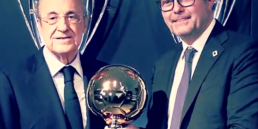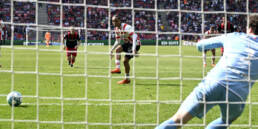by Massimo Franchi
Third overall in 2021 (behind the Canary Islander Pedri and the Englishman Bellingham), fourth last year (after the Andalusian Gavi, the ever-present Bellingham, and the Frenchman Camavinga), twenty-year-old German-Nigerian Jamal Musiala forcefully presents himself as a candidate for the Golden Boy 2023. He is the hero of Bayern, who, on the final day and in the last minute, overtook Borussia Dortmund (of arch-rival Bellingham), securing their eleventh consecutive Bundesliga title: precisely one-third of the gleaming “Deutsche Meisterschale” that shines in the centuries-old history of the Bavarians. His winning goal came just over three weeks ago, right as the 90th minute was about to expire at the RheinEnergieStadion in Cologne. Manager Tuchel had substituted him in just 5 minutes earlier, replacing the Moroccan defender Mazraoui, with the score still tied at 1-1. It was a moment of desperation and psychodrama for the (former) yellow-black league leaders, who only found an irrelevant home draw against Mainz (2-2, with Süle’s goal) in the 96th minute at the Signal Iduna Park, which fell silent upon hearing the news of Musiala’s overtaking goal.
DEFEATING BELLINGHAM
A season to remember, not only for that decisive goal: in 33 matches played in the last Bundesliga, the former Chelsea attacking midfielder scored a total of 12 goals and even provided 13 assists (with only one yellow card). Outperforming his great rival Bellingham, who collected 8 goals and 5 assists in 31 matches (with 8 yellow cards). Therefore, Musiala will start as the favorite when the list of the top 100 names competing for the Golden Boy is announced. However, we will have to wait and assess the impact of Bellingham in Real Madrid, his new club as of a few days ago. At the moment, the discussion about the possible winner of the Golden Boy 2023 seems to be narrowed down to a super showdown between these two young midfielders, each worth over 100 million euros.
SNATCHED FROM CHELSEA
An early and formidable talent, Musiala is capable of playing in all midfield roles. He excels as a central playmaker or as an attacking midfielder, not just in his “classic” position as a trequartista. A versatile and universal player, he conceals the ball from opponents, scores, assists, creates opportunities, tracks back, presses, works tirelessly, and sacrifices himself. A dazzling phenomenon. He already has 21 appearances (with 1 goal) for the German national team (Bellingham with 24/1 for England). In Munich, they are enjoying this sensational prodigy, while in London, on the Chelsea side, they still despair. How was it possible to let one of the most promising teenagers in world football slip away in July 2019, pocketing only a “meager” training compensation of €200,000 at Stamford Bridge? It is a testament to the skill of the Bayern executives and the scouts hired by Rummenigge, but at the same time, it is a glaring negligence on the part of their Chelsea counterparts, who were under the ownership of “blue” patron Abramovich at the time. “He is fantastic,” exclaimed the enthusiastic comment on the mixed-race boy, whose blood carries German-Nigerian heritage, by the legendary Beckenbauer, “Kaiser” Franz, “Herr” Bayern, the ultimate embodiment of Bayern, the club for which he still serves as honorary president at the age of 77, or perhaps it’s better to say “eternal” president.
THE BEGINNINGS IN FULDA
Musiala was born in Stuttgart, the city of Mercedes-Benz and Porsche, on February 26, 2003. His mother, Carolin, is German of Polish origin: the classic Teutonic girl with blond-copper hair, blue eyes, and fair skin. His father, on the other hand, is a towering figure of ebony. His name is Daniel Richard, known as “Rich.” He is Nigerian, a former low-level footballer in his home country before moving to Germany. The name Jamal means “beauty” in Arabic, with transliterations such as Jamil, Djemal, Gamaal, and Cemâl. When he was 2 years old, the family moved two hundred kilometers north. They left Swabia and went to Hesse. Their destination was Fulda, a baroque city with a population of 70,000, famous for the Cathedral where the remains of Saint Boniface, Bishop (Sankt Winfried in German), rest and for the historic high-tech tire factory belonging to the Goodyear galaxy. It is here that the mother, the dominant figure in the family, begins her studies in Social Sciences. The child adores football. His parents enroll him in the TSV Lehnerz soccer school, a northern suburb of Fulda. He is only 4 years old, but he already shows his skills when his first coach, Micha Hoffmann, welcomes him to the team. “Less than two years later, he led the Under 7 team to victory in a local tournament, scoring between 5 and 10 goals per game. We decided to let him play with older boys.” His new coach becomes Branko Milenkovski, a German of North Macedonian origin, who recalls him as follows: “A special talent. It was as if he danced around the other players on the field.
ARRIVAL IN SOUTHAMPTON
At the age of 7, the child prodigy changes countries and moves with his family (which has grown with the birth of his sister, Latisha) to England. Specifically, they settle in Southampton because his mother, Carolin, has the opportunity to attend an Erasmus program course at the university in the port city, facing the Isle of Wight. His parents arrange for Jamal to join a soccer school. He auditions for City Central, a minor team, and leaves everyone astonished: 6 goals in 10 minutes. He catches the eye of Dick Hayes, a scout for Southampton. Immediate request for a trial at the “Saints Academy.” He becomes a special focus for Terry Moore, the head scout of the club’s youth sector. Moore’s comment: “Jamal is the most talented child I have ever seen; he tried to imitate some tricks of his favorite players on the field: Ronaldinho, Zidane, Henry, Messi. The club must do whatever it takes to sign him.” It is November 2010.
CORTESE AND ANCELOTTI
Rumors spread quickly, and soon the pilgrimage of scouts from all over England begins to admire the wonder kid. Chelsea and Arsenal are at the forefront and want to invite him to London for trials. In the midst of this, Nicola Cortese, a banker and executive chairman of Southampton, takes action. It is January 2011. Cortese summons the Musiala family to his office and, being Italo-Swiss, speaks to the boy in German. He guarantees that he will take all the necessary steps to tie Jamal to the club with a long-term training contract. The meeting impresses the family, but they have to return to Fulda as the Erasmus program has come to an end. Mom Carolin starts writing her thesis and plans to permanently move to England. Her priority is the multicultural metropolis of the United Kingdom: London. Thus begins the search for a job and an apartment in the British capital. She is soon hired as a marketing manager at an American company specializing in biological sciences, with its English branch located in Farnham, a town in western Surrey. Farnham is only about twenty miles away from Cobham, where Chelsea’s training center is located. And one fine day, dad Rich takes him to the realm of the Blues, whose first team is coached by Carlo Ancelotti. It is March 2011. Jamal, just 8 years old, passes the trial. Chelsea signs him.
POET AND CHESS PLAYER
In addition to being a super football talent, Jamal is an exemplary student. Polite and always humble. He achieves outstanding grades at Corpus Christi Catholic Primary School in Chestnut Grove, and later at Withgift School in Croydon. He is one of the winners in a poetry composition contest. He excels in chess, and to improve his agility and coordination, he attends hapkido courses, a Korean martial art (when he is not training with Chelsea). Thanks to him, the school team at Corpus Christi consistently qualifies for the finals of the “Premier League & Football League School” tournament, winning it three out of four times.
UNDER 16, TWO CHOICES
It is expected that a promising talent like him would be called up to the national youth teams. In 2016, he begins his journey with the Under 15 team, and then in 2018, he joins the Under 16 team of the so-called “Young Lions,” the English national youth teams. Due to his dual citizenship (allowed by FIFA regulations), he also accepts a call-up to a training camp with the Under 16 team of his native Germany. He plays only two matches under the guidance of coach Christian Wuck, where he doesn’t know any of his teammates. In the second game in Pirmasens (60 kilometers east of Saarbrücken), he comes on in the last 25 minutes, but the German team suffers a 4-1 home loss to Belgium. He appreciates the opportunity, but decides to return to the British setup where he quickly progresses: Under 17 and, directly, a quadruple leap to the Under 21 team led by Andy Boothroyd (now the coach of Jamshedpur in India). However, in the background, Bayern Munich quietly and diligently works to bring him back to his homeland. The Bavarian scouts have not overlooked the immense talent of their young compatriot. Thus begins a long, patient, and meticulous process to convince the family and the young player to accept the courtship of the “Star of the South,” the red team, the most famous and successful in the history of German football.
A RED GIFT
The first representative of Bayern to approach the Musiala family is Alexander Moj, a German coach of Polish origin from the Bavarian Under 16 team. He saw him play for the first time in London at a tournament in 2015 and was impressed. A year later, he saw him again during another youth competition in Warwick, in the Midlands, about twenty kilometers south of Coventry. This time, he approached the boy and his parents to have a conversation, in German, of course. Moj describes it as a very pleasant conversation. Before leaving, he bid farewell to the family (which had grown with the birth of Jerrell, the youngest brother in the Musiala household) with the classic “Auf Wiedersehen.” However, before leaving, he presented a gift hidden in his bag: a package containing official Bayern gadgets (including ones for the younger sister and brother) because he knew that Jamal, before moving to England, was a fan of the red team. It was a smart move, appreciated by the Musiala family. The contact had been made, and they exchanged phone numbers. Then it was the turn of Marco Neppe, head scout of Bayern (now promoted to sporting director), to visit England multiple times on a mission to monitor the boy’s progress starting from 2017. Finally, in July 2019, the Bosnian sporting director at the time, Hasan Salihamdizic, finalized everything in great secrecy at the headquarters in Munich. The family (adequately “catechized”) explained to the Chelsea youth department executives that Brexit could negatively impact their future, especially the boy’s. They wanted him to grow up in a European Union country that was more open to the international market and would not limit his prospects in any way.
ONLY GERMANY
“It seemed right to me to go to Bayern,” Musiala concludes, “and let’s be honest: when a club like Bayern wants you, you can’t refuse.” At first, he is entrusted to the care of Miroslav Klose in the Under 17 team. Soon, he captivates the first-team coach Hansi Flick (now the manager of the German national team), who doesn’t look at age and calls him up to the senior squad. In turn, the teenager dazzles Flick by immediately nutmegging him during training. Playing alongside idols like Neuer, Thomas Müller, Sané (who dubs him “Bambi”), Gnabry, Kimmich, Goretzka, and others, Jamal takes little time to definitively choose to play with them for the German national team as well. Joachim Löw, the German national team coach at the time, visits the Allianz Arena in Munich to speak to him, and then Jamal announces, “It wasn’t an easy decision because I have two hearts, a German one and an English one, both pulsating. But I was born in Stuttgart, and that counts. I explained it over the phone to the English coach, Southegate.” The German press refers to him as the new Matthäus and calls him “Juwel” Musiala, the jewel. Now he is a leading candidate for the Golden Boy 2023 award. The great beauty – just like the meaning of his name – of today’s and tomorrow’s Bayern.


